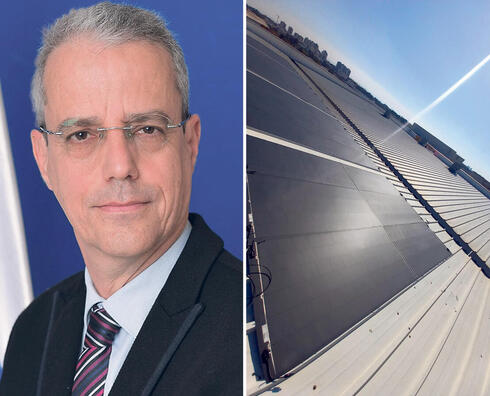
Analysis
Not so hot for Climatech: Governmental budget cuts paint bleak picture
The budget of the Chief Scientist at the Ministry of Energy is set to be cut in half, harming startups and academic research in the fields of renewable energy. Global warming is almost of no interest to the current government, and entrepreneurs in the field express concern for the future of Israeli climatech
Israel wants to be at the forefront of the global climatech industry but is not allocating money for it. The budget of the Chief Scientist at the Ministry of Energy is set to be cut in half in the next state budget compared to the previous two years. The result will not only be reduced assistance to fewer startups and academic research, but also the shutting of research institutes in the fields of energy storage and nuclear fusion. Entrepreneurs in the field are outraged by the decision to specifically damage innovation budgets, and say that "this is a blow to the field."
In 2022, the Ministry of Energy allocated approximately NIS 120 million (approximately $33 million) to the Chief Scientist's office, and a similar amount was allocated in 2021 as well. The office will is now set to receive just NIS 65 million - a 40% difference compared to the past two years. As a result, the amount allocated to grants for startup ventures in the initial stages may be 30% lower compared to the past two years. The budget cut in the Chief Scientist's office endangers the activities of research institutes whose establishment was festively announced in recent months. Among other things, this affects a nuclear fusion project for which a budget of NIS 30 million is required for five years and an energy storage venture towards which the Ministry of Energy had committed NIS 100 million over five years.
Entrepreneurs in the energy field are outraged by the government's decision to harm energy innovation, despite repeated statements in recent years that Israel will lead the field of technological solutions to the climate crisis. Without government investment, it will be difficult for the sector to grow, while venture capital funds are reluctant to invest in high-risk technological ventures, which often require many years of research and development. According to Eshel Lipman, a Venture Partner at the Extantia fund and co-founder of the Israeli Energy Tech Community, "the Ministry of Energy creates a fertile ground for new ideas for ventures and researchers, and at the same time creates the regulation that will allow the introduction of technologies that will be revolutionary in the future, even if their economics have not yet been realized. Without increasing government support, the state is signaling to investors that it is not interested in supporting complex fields, but only cyber or fintech."
Over the years, the Ministry of Energy has invested in companies such as Phinergy, H2Pro, Augwind, and Apollo Power that have been successful since then. The Chief Scientist's budgets in the last two years were based, among other things, on a future account of the carbon tax, which was presented by the previous government. The legislative procedures have not been completed, and the intention to legislate the carbon tax is not on the current agenda. In addition, according to information obtained by Calcalist, the Ministry of Finance claimed that the Chief Scientist's budget should be part of the Israel Innovation Authority's budget, therefore all the budgets required for startups should come from the authority itself, and not from other ministries. However, the Innovation Authority's budget, which stands at about one billion shekels per year, has not increased for a decade and has eroded over the years. The high-tech scene in Israel grew while the Authority's budgets lost value, with the Authority also required to budget startups in many fields, and not only in the climate field.
Related articles:
The historic decision has become history
In June of last year, the government approved a decision to promote innovation in climatech through a budget of approximately NIS 3 billion until 2026. However, when the decision, which was labelled as "historic" by the government, was passed, no budgetary allocation was made, and the government explained that the amounts required for the implementation of the plan would be allocated in 2023. The Innovation Authority is entrusted with the main implementation of the plan, but it did not receive a single additional shekel from the government for its implementation, and is forced to budget the sector with its meager budget, which has not grown for a decade. The Authority does not allocate a specified amount to implement the government's decision or to invest in climate and energy projects. Although the government committed to allocating NIS 3 billion to the field, it now turns out that part of the amount is supposed to come from the European Union's Horizon budgets, which will only be allocated to startups that are approved by the EU.
Investment in climatech ventures in the private market has increased in recent years. Last year, about NIS 1.5 billion was invested in the field in Israel by private funds. In 2022, the Innovation Authority invested approximately NIS 150 million in projects, incubators, associations and issues related to climate, the same amount as was invested in 2019, and lower compared to 2020 and 2021. The authority allocated grants to about 40 startups in the energy field, compared to about 50 companies and 60 academic studies in the field which received funding from the Chief Scientist.
According to Lipman, "It is true that the Innovation Authority is doing its job and increasing its support in the field - but there are places where its tracks do not cover certain sectors and the Chief Scientist of the Ministry of Energy does. Multiple opinions and multiple opportunities are important."
Energy is a field where the grants are required because of the high cost of hardware development, the long sales times and dealing with regulation - which is why the support of the relevant ministry is so important. The weighted support in the field of energy and climate in Israel is significantly smaller than in other developed countries.
The world is moving forward, Israel is left behind
Israel is not living up to its promises and is far from catching up with the advanced countries in the world, which invest a lot of money in projects to reduce greenhouse gas emissions and in the fight against one of the greatest crises known to mankind. In the United States, the administration decided to invest $370 billion in the transition to clean energy, and the European Union plans to allocate about 280 billion euros to the transition to a zero-carbon economy.
The field of research and development in Israel is also not in line with what is happening in the world. According to the State of Science report of the National Academy of Sciences, the rate of Israeli national expenditure on academic research and development has fallen sharply in the last decade compared to the OECD countries. In about a decade, Israel has dropped from second place to 21st place in the OECD countries in the rate of national expenditure on research and development in relation to GDP.
The Treasury said in response that the Ministry of Energy's budget has increased, and that it is possible to budget for research institutes. However, it should be noted that most of the increase is intended for connecting factories to gas, and that the budgeting of the research institutes will come at the expense of the startups.

